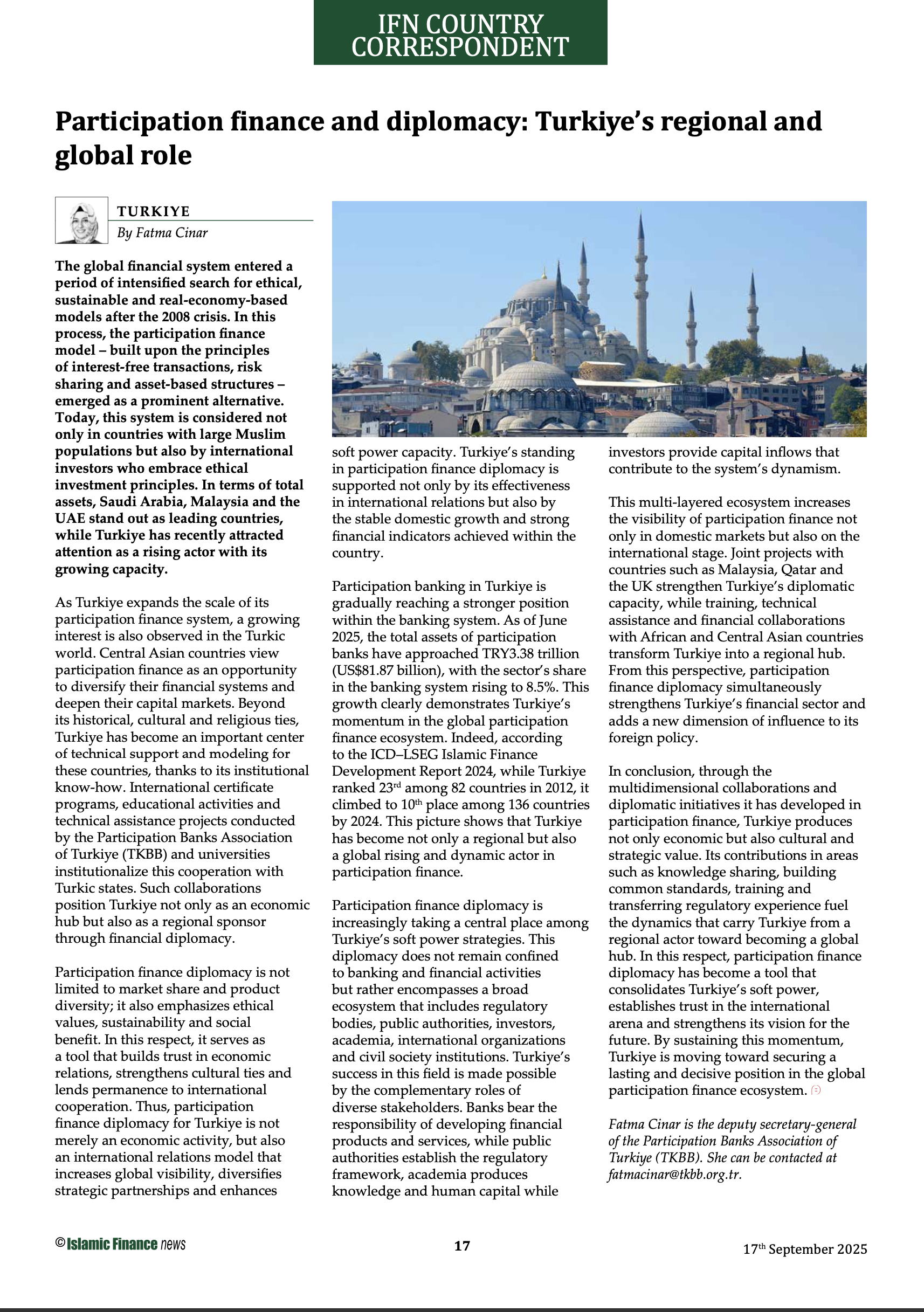By Fatma Cinar
The global financial system entered a period of intensified search for ethical, sustainable, and real-economy-based models after the 2008 crisis. In this process, the participation finance model—built upon the principles of interest-free transactions, risk sharing, and asset-based structures—emerged as a prominent alternative. Today, this system is considered not only in countries with large Muslim populations but also by international investors who embrace ethical investment principles. In terms of total assets, Saudi Arabia, Malaysia, and the United Arab Emirates stand out as leading countries, while Türkiye has recently attracted attention as a rising actor with its growing capacity.
As Türkiye expands the scale of its participation finance system, a growing interest is also observed in the Turkic States. Central Asian countries view participation finance as an opportunity to diversify their financial systems and deepen their capital markets. Leveraging its historical, cultural, and religious ties, as well as its institutional know-how, Türkiye has positioned itself as a key hub for technical assistance and a model for these countries. International certification programs, educational initiatives, and technical support efforts led by the Participation Banks Association of Turkey (TKBB) and universities are formalizing cooperation with the Turkic states. These partnerships have elevated Türkiye’s role from merely an economic center to that of a regional leader through the practice of financial diplomacy.
Participation finance diplomacy is not limited to market share and product diversity; it also emphasizes ethical values, sustainability, and social benefit. In this respect, it serves as a tool that builds trust in economic relations, strengthens cultural ties, and lends permanence to international cooperation. Consequently, participation finance diplomacy has evolved from a purely economic activity into a sophisticated model of international relations for Türkiye — one that amplifies global visibility, diversifies strategic partnerships, and reinforces the nation’s soft power. This distinguished position is sustained not only by Türkiye's expanding influence in international affairs but also by its steady domestic economic growth and solid financial performance.
Participation banking in Türkiye continues to strengthen its foothold in the national banking sector. By June 2025, participation banks’ total assets had climbed close to TRY 3.38 trillion, capturing an 8.5% market share. This upward trajectory signals Türkiye’s accelerating momentum in the global participation finance arena. Notably, the ICD–LSEG Islamic Finance Development Report 2024 shows Türkiye rising from 23rd place among 82 countries in 2012 to 10th place among 136 countries by 2024 — a clear indicator of its evolution into one of the most dynamic and rapidly emerging players on the global stage.
Participation finance diplomacy is rapidly becoming a cornerstone of Türkiye’s soft power strategy. It transcends traditional banking and finance, encompassing a collaborative ecosystem that brings together regulators, public authorities, investors, academia, international institutions, and civil society. Türkiye’s success lies in the synergy of these stakeholders: banks innovate financial products and services; public authorities establish enabling regulations; academia generates knowledge and talent; and investors inject capital that fuels growth. This integrated framework boosts the visibility of participation finance both at home and globally. Strategic partnerships with Malaysia, Qatar, and the United Kingdom have strengthened Türkiye’s diplomatic reach, while education, technical assistance, and financial collaborations with African and Central Asian nations have established Türkiye as a regional hub. Thus, participation finance diplomacy not only bolsters the country’s financial sector but also amplifies its influence in global affairs.
In conclusion, through its multifaceted collaborations and diplomatic initiatives in the field of participation finance, Türkiye generates not only economic but also cultural and strategic value. Its contributions in areas such as knowledge sharing, the establishment of common standards, education, and the transfer of regulatory expertise are fueling the dynamics that are transforming Türkiye from a regional actor into a global hub. In this respect, participation finance diplomacy has become a tool that reinforces Türkiye’s soft power, builds trust on the international stage, and strengthens its vision for the future. By sustaining this momentum, Türkiye is steadily moving toward securing a permanent and influential position within the global participation finance ecosystem.
Fatma Çınar is the deputy secretary general of the Participation Banks Association of Türkiye (TKBB). She can be contacted at fatmacinar@tkbb.org.tr.
This article was first published in IFN Volume 22 Issue 38 dated the 17th September 2025.
